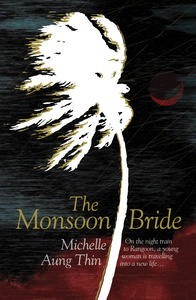 The Monsoon Bride
The Monsoon Bride
by Michelle Aung Thin
TEXT
ISBN 9781921758638
Reviewed by Paul Giffard-Foret
Politics of Desire and the Colonial Machine
In the much politicised and somewhat romanticised discourse around present Burma (a.k.a. Myanmar) in the Occident, Michelle Aung Thin in her debut novel The Monsoon Bride has chosen to explore the nation’s British colonial past instead in such a way that encourages the reader to trace a historical lineage of oppressive power structure between the current Burmese military-based dictatorial regime and the colonial state that preceded it.
Michelle was born in Rangoon, Burma, and moved to live in Canada with her family as a child. She completed her PhD in creative writing in Adelaide under the supervision of Australia’s acclaimed author Brian Castro, and now lives in Melbourne. The Monsoon Bride is the product of her doctorate. Like Castro, her novel demonstrates a strong interest in questions of identity, belonging, and hybridity.
Two of its main characters are from mixed-raced, Eurasian backgrounds. This “third field” of vision is I believe what allows Aung Thin’s novel to distance itself from traditional Orientalist narratives of Burma and the East more generally, as well as from “nativist” discourses of authenticity which in the politically-charged context of Burmese intestine wars is a potential asset and the producer of valuable critical insights.
Chiefly drawing from family tales and personal research rather than memory or the actual experience of living in Burma, The Monsoon Bride is not a historical novel, but rather a fictionalised account of life in Rangoon in an attempt at capturing what Aung Thin herself describes at the time as ‘a very vibrant city [with] different people from all over the world who’ve come to make their fortunes.’[1]
The year is 1930, in an in-between time of ontological uncertainty directly following the stock market crash with the rise of Burmese independent movement and the gradual decline of Britain’s colonial grip over Burma’s internal affairs. Not incidentally perhaps, as Aung Thin commented elsewhere, an earthquake happened in 1930, a year she sees as ‘formative’, for ‘those are the pressures that have created the Burma that is there today.’[2]
In the words of Mary Callahan in her political essay on ‘Myanmar’s perpetual junta’ published in New Left Review, ‘the [British] decapitated the indigenous social order, and instituted a policy of ethnic divide-and-rule – ‘martial’ frontier races against the centre – that was extreme even by imperial standards.’[3] As she adds: ‘If the military and jurisdictional division of the country had first been imposed by British colonialism, its continuation after independence represented both a political and a moral failure on the part of the Burman-dominated state.’[4]
Nationalism
With such legacy in mind, The Monsoon Bride, like most postcolonial fiction, remains wary of the nationalist project that led to independence. As an illustration, Aung Thin’s depiction of the nationwide Dobama Asiayone, or “Our Burma Association”, formed in 1930 and mainly composed of students and lawyers, is particularly scathing. The association aimed ‘to promote unionization and worker-peasant solidarity [against the colonial administration] and was in the forefront of the strikes and demonstrations of the time.’[5]
So at the start of the novel, Winsome, a convent girl from the countryside recently married off to Desmond, of mixed-race too, finds herself submerged by a seawave of protesters marching in the streets and shouting ‘ ‘we’ (or maybe ‘us’) and this we/us was repeated again and again.’ (30) The sense of collectivity, of ‘be[ing] one among so many,’ (31) is however called into question as she realises how ‘we/us so easily might mean not-you.’ (30)
The individual’s dilution into ‘one seething skin, born from that one voice, we/us’ (31) in which she felt entirely alone (31) gives way to a larger critique in the parodial mode of the Thakins’ movement (meaning ‘master’ in ironic defiance of the British’s paternalistic attitude towards the colonised) and the Marxist project to which they subscribed.
Of middle-class background, highly educated, some of them in London, and with ‘an unwavering faith in ‘progress’ and modernity,’[6] as Callahan argues, their portrayal by Aung Thin in turn reduces them to “mimic men” – ‘ for they were all men…black men, brown men, yellow men…hard-eyed with thin, pinched faces’ (30) – with ‘no centre and no direction’ (32) and who play at being, rather than are, communists, as evident in one of the rare women present at the demonstration and the speech she delivers to the crowd:
‘My friends’, came the girl’s voice through the megaphone, a little reedy for being further away, ‘my comrades, we share a cause.’ There were jeers from the labourers – comrades, they would be laughing at the very idea – but of course this did not deter that steely young woman, who merely adjusted the angle of her attack. ‘Wealth,’ she cried, ‘is the foundation of all power. And we shall be poor no longer.’ (32)
Desire
Contra the “Great March of History” and the big narratives of modernity, Aung Thin as a writer with an interest in subjectivity and interpersonal relationships instead articulates in her novel what may be defined as a politics of desire through focusing on the triangular love affair between Winsome, Desmond, and his British employer Jonathan Grace.
The novel however does not fall into the postmodernist trap of removing the Subject from history or agency. Personal desire is primarily shaped by external factors, colonialism in particular. Such is in effect the driving force and law of (e)motion behind the characters’ actions – what constitutes in the incipit a metaphor for those “lines of flight” that Winsome seeks as she boards the train toward a new life in Rangoon:
She had felt a violent lurch to the left and when she looked out the window into the dark night, there was the gleam of a new track running along them. That glimmer was a sign the city was close and indeed she could feel this imminence in the train’s momentum. ‘Soon, soon, Rangoon, Rangoon…’ (3)
Perhaps Aung Thin’s greatest achievement in The Monsoon Bride is the way she powerfully communicates the paradoxical sense of Oriental lethargic spleen and langor, ‘boredom and loneliness’ (18), decay and disease, as well as a feeling of agitation, over-excitement and rebirth, which is not so much symptomatic of Rangoon’s tropical climate as it characterises the stulsifying rigidity, the ‘sucking stillness’ (14) of the colonial theatrical decorum and its stratisfied hierarchies.
This is how Winsome reviews her surroundings at the European Refreshment Room:
Around the room, white men and women in expensive travelling clothes watched from over their own cups while along the walls, behind the boilers, black eyes stared out of impassive brown faces. The bearer waited. Desmond stood stiffly, his arms at his sides. (14)
Ultimately, both are forced to leave since they do not fit into the picture, neither black nor white.
Within the colonial machine, based on ‘an ‘us’ and a ‘them’ maintained by a small set of rules’ (188), desire – the desire for transcendence, for love, for being able to reach the ‘Other’ – occurs through simultaneous ‘revulsion’ and ‘desire’, ‘one so like the other’ (104). Colonialism and the longing (and fear) of becoming-other – ‘between here and that other life, like the space between one heartbeat and the next, the difference between who you were and who you might become’ (190) – is what pushes Winsome and Jonathan towards each other and what eventually pulls them apart.
As newness enters the world toward the end of the novel, and as Jonathan and Winsome are forced beyond the illusion of romance to confront hard facts, love is temporarily stripped bare of its social weight to become “pure” desire: ‘He moved his hands across her lips, over her hair, her breasts, he rubbed his face against her skin, his fingers searching for this new woman, measuring her against the one he had known.’ (223)
Again, desire in the novel is not merely sexual, but (bio)political. Such is the strength of The Monsoon Bride that it always associates physical desire with the lack of, or hunger for, a world beyond the colonial machine: ‘There was a word for it, a word like poverty. Paucity. That was it. She would have said it out loud if he had not been beside her. It meant not enough, never enough.’ (136) The impending Burmese revolution itself is in fact driven by a politics of desire.
This is how Winsome’s employer, a respected Burmese photographer and a representative of Rangoon’s aspiring middle-class as well as a supporter of the Thakin Movement, describes her sojourn in Europe: ‘It was not awe that she felt among those much lauded icons of their civilisations, not jealousy either, but something worse; it was as if she had lived through a famine and could never again have enough to eat.’ (161)
Becoming-woman
In her essay, ‘The Name Game’, Michelle Aung Thin expressed her fear that the word ‘bride’ in the title of her novel may seem too ‘girly’: ‘You see, while I write like a woman I find that I am worried about being read as one.’[7] Like her female character Winsome, Michelle’s writerly journey is driven by a similar desire to subvert socio-cultural expectations of a woman (writer)’s place, and her awareness that ‘only a fraction of women are reviewed in the major literary magazines compared to men.’[8]
In this regard as in many other aspects, The Monsoon Bride is a immense success. As for Winsome,
These were heaty days, when something in the thick air loosened her joints and razed her judgment so that she looked when she should have turned away, stared when she should have cast her eyes down. It was on a heaty day that she first realised Rangoon was a city of men; men pulled rickshaws, drove buses, important men in light-coloured suits rushed along Phayre Street, holding their noses against the smell of drains. White men, brown men, black and yellow men, bunched like so much ripening fruit. She imagined them falling, warm from the branch, onto the flat of her hand. (27)
[1] Aung Thin, Michelle. ‘Interview’.
<http://rastous.podomatic.com/player/web/2011-08-24T18_07_46-07_00>
[2] Aung Thin, Michelle. ‘Interview’.
<http://podcast.3cr.org.au/pod/3CRCast-2011-09-15-70155.mp3>
[3] Callahan, Mary. ‘Myanmar’s perpetual junta’, New Left Review 60, Nov-Dec 2009, p. 56.
[4] Ibid, p. 31.
[5] Ibid, p. 36.
[6] Ibid, p. 39.
[7] Aung Thin, Michelle. ‘The Name Game’. (2010)
<http://wheelercentre.com/dailies/post/ed76a7fe9b16/>
[8] Ibid.
 Previously published at Asian Cha, The Reading Hour Magazine, Pratilipi, Switched on Gutenberg and The Pittsburgh Quarterly, I veer between the conventional and experimental in terms of style. Favorite poets include Jayanta Mahapatra, Billy Collins, Neruda and W.S.Merwin. Originally from India, I live and work in the United States.
Previously published at Asian Cha, The Reading Hour Magazine, Pratilipi, Switched on Gutenberg and The Pittsburgh Quarterly, I veer between the conventional and experimental in terms of style. Favorite poets include Jayanta Mahapatra, Billy Collins, Neruda and W.S.Merwin. Originally from India, I live and work in the United States.








